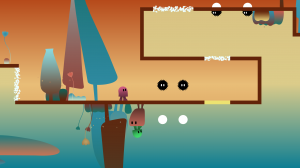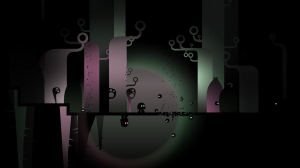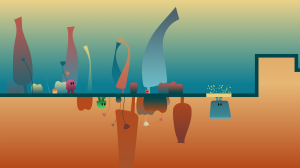 We finally come to examine the sole remaining game of Sony’s PLAY 2013 promotion, Ibb & Obb. Planned for a downloadable PC release later in the year, this co-operative puzzle-platformer is currently a timed exclusive on the PS3’s PlayStation Store, and presents a deceptively challenging gauntlet of obstacles that you must work in tandem with a partner to solve.
We finally come to examine the sole remaining game of Sony’s PLAY 2013 promotion, Ibb & Obb. Planned for a downloadable PC release later in the year, this co-operative puzzle-platformer is currently a timed exclusive on the PS3’s PlayStation Store, and presents a deceptively challenging gauntlet of obstacles that you must work in tandem with a partner to solve.
This is both Ibb & Obb’s greatest strength and most fatal weakness too. If you have an equally skilled puzzle-platformer enthusiast friend to play with, then the game hits all the right notes as far as being a satisfying and rewarding play experience. If you’re trying to play alone however, the game is frustrating to the point of being nigh on unplayable, and just won’t be worth the download for people wanting to play solo.
So, what exactly is the premise behind Ibb & Obb then? Well, you and ideally a buddy take control of two simplistic colourful shapes on feet, the titular Ibb and Obb. Who these little critters are and what exactly they’re attempting to accomplish is mostly left up to the player’s imagination. All you need to know is that there are some tricky physics puzzles and some dangerous enemies standing between you and the finish line throughout each level. Just one touch of a dangerous obstacle for one character will instantly kill both as well, forcing you to be kicked back to your last (generously placed) checkpoint. Good luck!
 We mean it too, because, like every other PLAY 2013 offering, Ibb & Obb is no cakewalk! Many of the later puzzles especially require pitch-perfect co-operation between you and another player. One false move will botch the entire process, forcing you to repeat whatever running, jumping and plane-hopping you needed to do to proceed ahead.
We mean it too, because, like every other PLAY 2013 offering, Ibb & Obb is no cakewalk! Many of the later puzzles especially require pitch-perfect co-operation between you and another player. One false move will botch the entire process, forcing you to repeat whatever running, jumping and plane-hopping you needed to do to proceed ahead.
Oh yes, plane-hopping is one of the key platforming hooks of Ibb & Obb. You see, there are two separate planes of existence in this mysterious game world, both with reversed sets of gravity. Walking on the top section as normal is well and good, but if you hop through a portal (some of which are colour-coded so that only Ibb or Obb can pass through them), you’ll end up on the underside of the area, sucked up to the ceiling and forced to try and operate with reversed gravity.
Again, with a partner, this is very clever. Working in tandem to master two different planes of gravity and spatial reasoning can be very satisfying and beautiful when you finally pull it off. Consequently, the game’s peaceful electronica score and striking artistic visual style almost make Ibb & Obb look like video gaming poetry when you can properly master it in motion. The combination of the eerily serene and peaceful graphics and music feels very reminiscent of Electroplankton on DS, and you can tell that a lot of work has been put into the aesthetic design of the game.
 How you ‘fight’ enemies also makes clever use of the gravity-switching. Oftentimes, you’ll come across foes that are dangerous on one plane, but can be eliminated on both planes simply by touching them on the opposite plane, if that makes sense. Touching their vulnerable white incarnation on one plane will lead to them spilling score-boosting gems to be collected by whichever character is on the opposite plane. These gems boost your score, which is useful for collecting Trophies mainly. Make sense? Well, it will when you actually play.
How you ‘fight’ enemies also makes clever use of the gravity-switching. Oftentimes, you’ll come across foes that are dangerous on one plane, but can be eliminated on both planes simply by touching them on the opposite plane, if that makes sense. Touching their vulnerable white incarnation on one plane will lead to them spilling score-boosting gems to be collected by whichever character is on the opposite plane. These gems boost your score, which is useful for collecting Trophies mainly. Make sense? Well, it will when you actually play.
Again however, this is all assuming you have either a local or online partner to bring along, and a reliable one at that. Trying to work your thumbs in the right manner to overcome such demanding obstacles will simply have you wanting to throw your controller through the TV.
On paper, the solo play is at least moderately thought-out. You simply use one analog stick for Ibb, and the other for Obb. Each analog stick is used for both moving and jumping (you jump by moving the analog stick up or down, depending on which plane you’re currently standing in), and you don’t use any buttons or functions to play the game, beyond cycling through menus. Taken as a concept, it seems clever.
 Then you try it and you see that it just doesn’t work. It might have worked had Ibb & Obb not been so astonishingly punishing and demanding with its level design, but it’s clear that the game has no patience for people wanting to try and play by themselves. Yes, there is a Trophy to earn for beating the game by yourself, but we’d eat our hats if we found out that more than five percent of the people who attempted to play this game solo had actually earned it!
Then you try it and you see that it just doesn’t work. It might have worked had Ibb & Obb not been so astonishingly punishing and demanding with its level design, but it’s clear that the game has no patience for people wanting to try and play by themselves. Yes, there is a Trophy to earn for beating the game by yourself, but we’d eat our hats if we found out that more than five percent of the people who attempted to play this game solo had actually earned it!
Mercifully however, you are at least allowed to try and seek out allies online via PlayStation Network, but that’s still luck of the draw, especially considering that Ibb & Obb is definitely the least promoted and least recognized game in the PLAY 2013 lineup. Even if you do get matched up, you may end up with a player who is no good, or isn’t willing to co-operate, or whatever else.
Thus, the game is very dependent on you having an established gaming friend to play with, and ideally one that can pick up a second PS3 controller and sit on the couch with you at that. When you find that right player, then you can really appreciate the engaging stage design and clever sense of artistic beauty behind Ibb & Obb. Until then however, you’ll just be left to wonder after trying to cut your teeth on the level design.
 At the very least, the level design does a good job of mixing itself up between areas, but it only gets more and more unapproachable without a partner later on. Later stages will plunge you into darkness, only making it all the more painstaking for a solo player to try and manage both of their characters. You’ll also have to direct both characters as they float in bubbles, try and position them just right for their momentum to carry them through multiple portals, balance one on top of the other so they can reach higher areas, and other feats that are much, much less of a headache if you have a capable second player along with you!
At the very least, the level design does a good job of mixing itself up between areas, but it only gets more and more unapproachable without a partner later on. Later stages will plunge you into darkness, only making it all the more painstaking for a solo player to try and manage both of their characters. You’ll also have to direct both characters as they float in bubbles, try and position them just right for their momentum to carry them through multiple portals, balance one on top of the other so they can reach higher areas, and other feats that are much, much less of a headache if you have a capable second player along with you!
It’s sad, because we can see how well-designed the game is, and how much work has gone into it in every respect, but Ibb & Obb shot itself in the foot by being so co-op-dependent, and combining that by being so punishing and surgical. It limits the audience very sharply, and it makes so much of the game feel like a wasted effort to anyone who doesn’t have a reliable gaming ally looking to be challenged as much as they are.
 It’s because of these unfortunate limitations that we feel Ibb & Obb is arguably the weakest of the four PLAY 2013 games, and that’s really disappointing. Despite that, it’s actually a solid game if you can satisfy its high barrier of entry. It’s very tough, but at least the stages feel rewarding and worthwhile to play through if you can challenge them with the right co-op ally.
It’s because of these unfortunate limitations that we feel Ibb & Obb is arguably the weakest of the four PLAY 2013 games, and that’s really disappointing. Despite that, it’s actually a solid game if you can satisfy its high barrier of entry. It’s very tough, but at least the stages feel rewarding and worthwhile to play through if you can challenge them with the right co-op ally.
There isn’t much else to say about it either. The game is very, very straightforward in terms of how you actually play it, and echoes the physics-based sensibilities of games like Electroplankton and Portal to great effect, albeit demanding a partner. If you’re a fan of Portal 2’s co-op component specifically, then Ibb & Obb is a game for you. Unfortunately, you just can’t appreciate any of this by fumbling around in a solo playthrough however, as we’ve repeatedly stressed.
If you’re specifically in the market for a challenging puzzle-platformer experience that you can enjoy with a PlayStation gaming friend that enjoys hardcore gaming as much as you do, then Ibb & Obb is worth checking out. If you aren’t looking to bring another person in on the fun however, then just skip this game. The other PLAY 2013 offerings are much more friendly and rewarding in terms of solo play, even if they’re also tough, often uncompromising experiences.
Perhaps Ibb & Obb can potentially tweak a few things to make it more solo-friendly when it comes to PC, if it still bothers to do so in the end, but its current PS3 build could have done with being a lot more accessible. Its clear inspiration and design efforts would have been much easier to appreciate that way.

